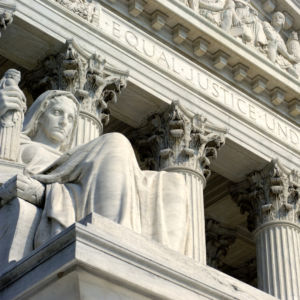The U.S. Supreme Court in an unanimous Monday decision made it harder for patent trolls to sue companies in troll-friendly district courts.
According to Monday’s ruling in TC Heartland v. Kraft Foods, plaintiffs seeking to file patent infringement lawsuits against defendant companies will now have to sue in the states where those companies are incorporated.
Monday’s ruling comes in favor of Indiana-based TC Heartland, which makes flavored water sweeteners. Kraft Foods tried to sue TC Heartland for patent infringement in Delaware, the second-most sought after district for patent disputes. The case went to the Supreme Court after lower courts refused appeals to move the trial to Indiana.
The case has significant implications for the Eastern District of Texas, where more than a third, or 40 percent of all patent infringement cases are filed. Federal courts in east Texas have developed a strong reputation for sympathizing with patent holders and upholding patents, making it the number one destination for patent trolls — entities that often acquire patents for the singular purpose of suing companies that actually produce products for licensing and other fees.
All eight justices (Justice William Gorsuch had not yet been nominated when arguments were heard) reversed a 1990 federal appeals court ruling that allowed defendants to sue companies in any state where their products were sold.
Writing for the majority, Justice Clarence Thomas cited a 1957 Supreme Court precedent that said patent infringement allegations can only be filed in courts where the defendant resides.
“The question presented in this case is where proper venue lies for a patent infringement lawsuit brought against a domestic corporation,” Thomas wrote. “The patent venue statute, 28 U. S. C. §1400(b), provides that ‘[a]ny civil action for patent infringement may be brought in the judicial district where the defendant resides, or where the defendant has committed acts of infringement and has a regular and established place of business.'”
“In Fourco Glass Co. v. Transmirra Products Corp.,” he continued, “this Court concluded that for purposes of §1400(b) a domestic corporation ‘resides’ only in its State of incorporation.”
Thomas said the Federal Circuit Court of Appeals in Washington was wrong to rule otherwise in 1990 based on the notion Congress had amended the definition of corporate residence to say that “[f]or all venue purposes,” a corporation “shall be deemed to reside, if a defendant, in any judicial district in which such defendant is subject to the court’s personal jurisdiction with respect to the civil action in question.”
“The issue in this case is whether that definition supplants the definition announced in Fourco and allows a plaintiff to bring a patent infringement lawsuit against a corporation in any district in which the corporation is subject to personal jurisdiction,” Thomas said. “We conclude that the amendments to §1391 did not modify the meaning of §1400(b) as interpreted by Fourco. We therefore hold that a domestic corporation ‘resides’ only in its State of incorporation for purposes of the patent venue statute.”
Companies including Adobe, Ebay, Etsy, HP, Kickstarter, Oracle, Walmart, and others filed a brief with the court urging it to make the conclusion set down Monday.
The Computer and Communications Industry Association (CCIA), which also filed in support of TC Heartland, said the case “could prevent some patent trolls from bringing lawsuits…to the Eastern District in hopes of pressing for quick, profitable settlements in cases they couldn’t win in court.”
“This Supreme Court ruling can help curb decades of misuse of the patent system by restricting a common tactic used by patent trolls — forum shopping,” CCIA President Ed Black said Monday. “For too long patent trolls have relied on a combination of case load back up, high upfront legal costs, favorable rules in courts like the Eastern District and the cost of travel to pressure defending companies to settle court cases the trolls were unlikely to win on the legal merits.”
Black said it’s still the job of Congress to step in with comprehensive patent reform legislation.
“Patent trolls continue to drain $29 billion a year from U.S. companies, and while today’s ruling removes one tool used to manipulate the system, there are still others enabling the abuse of the patent system,” he added. “It’s an area ripe for bipartisan cooperation as Congress looks for low cost and no cost ways to grow jobs and the economy.”

